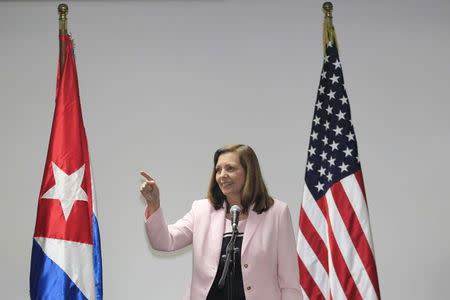U.S.-Cuba begin historic talks on restoring diplomatic ties

By Lesley Wroughton and Daniel Trotta HAVANA (Reuters) - The United States and Cuba began historic discussions on restoring diplomatic relations on Thursday, aiming to reach agreement on the opening of embassies in each other's countries. The meeting began at about 9 a.m. EDT (1400 GMT) led by U.S. Assistant Secretary of State Roberta Jacobson and Josefina Vidal, director of U.S. affairs at the Cuban foreign ministry. Seated opposite each other at separate tables both women were flanked by their chief of missions in Havana and Washington. They made no public remarks. Both sides have appeared cautious ahead of the talks, the first since U.S. President Barack Obama and Cuban President Raul Castro announced on Dec. 17 they would work to restore diplomatic ties snapped by Washington in 1961. A contentious session on immigration on Wednesday, led by Vidal and Jacobson's deputy, Alex Lee, accentuated the difficulties in overcoming half a century of hostilities. Senior U.S. officials say they hope Cuba will agree to reopen embassies and appoint ambassadors in each other's capitals in coming months. The United States also wants travel curbs on its diplomats lifted and for Cuba to hand over U.S. fugitives. Meanwhile, Cuba wants the United States to remove it from the U.S. list of state sponsors of terrorism, a move that is under review by the U.S. State Department. During talks on Wednesday, the Americans vowed to continue to grant safe haven to Cubans with special protections denied to other nationalities. Cuba complained the U.S. law promotes dangerous illegal immigration and protested against a separate U.S. program that encourages Cuban doctors to defect, calling it a "reprehensible brain drain practice". Jacobson's visit is the first to Cuba by a U.S. assistant secretary of state in 38 years. She is the highest-ranking U.S. visitor in 35 years. Despite resistance from some in Congress, Obama has set the United States on a path toward removing economic sanctions and a 53-year-old trade embargo against Cuba. U.S. Secretary of State John Kerry said on Wednesday he looked forward to formally opening a U.S. embassy in Cuba. Kerry also said he was prepared, when the time was right, to meet his Cuban counterpart, Bruno Rodriguez, with whom he has only talked by telephone. "And when it is timely, when it is appropriate, I look forward to traveling to Cuba in order to formally open an embassy and begin to move forward," Kerry told reporters in Washington. In his annual State of the Union speech on Tuesday, Obama urged Congress to start work on ending the embargo, but critics say Obama first needs to win concessions on a list of issues. They include: Cuban political prisoners and democratic rights, the claims of U.S. citizens whose property was nationalized after Cuba's 1959 revolution, and U.S. fugitives who have received asylum in Cuba. (Reporting by Lesley Wroughton; Editing by Daniel Trotta; and Peter Galloway)

